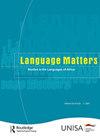语言教育政策实施的生态方法:以卡兰加语为例
IF 0.8
3区 文学
0 LANGUAGE & LINGUISTICS
引用次数: 2
摘要
继2013年津巴布韦宪法承认16种语言之后,2015年开始了课程改革进程,《教育法》也于2019年进行了修订。尽管以前有旨在促进使用少数民族语言的教育语言政策,但这里认为,以前政策中包括的大多数语言作为教育语言没有取得任何重大进展。因此,本研究考察了宪法、教育法和课程框架中规定的教育语言政策的实施情况,并以卡兰加为例进行了研究。本文认为教育语言政策受到更广泛的语言生态系统的影响,并确定了影响政策实施的生态因素。该研究采用定性方法,重点关注政府部门官员、学校校长、教师、家长和倡导团体的观点。研究结果表明,语言生态因素是不可忽视的,它们之间存在着相互关联的关系。本文章由计算机程序翻译,如有差异,请以英文原文为准。
An Ecological Approach to the Implementation of Language-in-Education Policy: A Kalanga Case Study
Abstract Following the recognition of 16 languages in the Zimbabwean Constitution in 2013, 2015 saw a curriculum reform process begin, and the Education Act was also amended in 2019. Even though there were previous language-in-education policies aimed at promoting the use of minority languages, it is contended here that most the languages included in the previous policies have not made any significant inroads as languages of education. The study therefore examines the implementation of the language-in-education policy as enshrined in the Constitution, Education Act and curriculum framework, using Kalanga as a case study. It argues that language-in-education policy is affected by the wider linguistic ecological system and identifies the ecological factors that affect policy implementation. The research takes a qualitative approach and focuses on the perspectives of a sample of ministry officials, heads of schools, teachers, parents and advocacy groups. The findings demonstrate that there are linguistic ecological factors that cannot be overlooked and exist in an interconnected relationship.
求助全文
通过发布文献求助,成功后即可免费获取论文全文。
去求助
来源期刊

Language Matters
Multiple-
CiteScore
1.20
自引率
0.00%
发文量
19
期刊介绍:
The purpose of Language Matters is to provide a journal of international standing with a unique African flavour focusing on multilingualism in Africa. Although the journal contributes to the language debate on all African languages, sub-Saharan Africa and issues related to multilingualism in the southern African context are the journal’s specific domains. The journal seeks to promote the dissemination of ideas, points of view, teaching strategies and research on different aspects of African languages, providing a forum for discussion on the whole spectrum of language usage and debate in Africa. The journal endorses a multidisciplinary approach to the study of language and welcomes contributions not only from sociolinguists, psycholinguists and the like, but also from educationalists, language practitioners, computer analysts, engineers or scholars with a genuine interest in and contribution to the study of language. All contributions are critically reviewed by at least two referees. Although the general focus remains on multilingualism and related issues, one of the three issues of Language Matters published each year is a special thematic edition on Language Politics in Africa. These special issues embrace a wide spectrum of language matters of current relevance in Southern Africa.
 求助内容:
求助内容: 应助结果提醒方式:
应助结果提醒方式:


